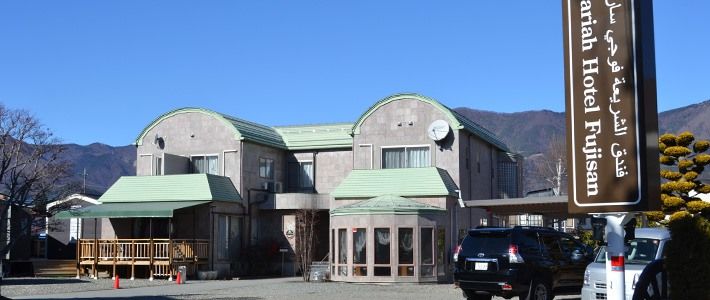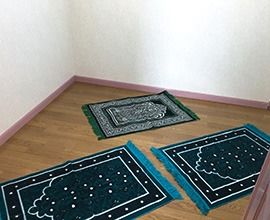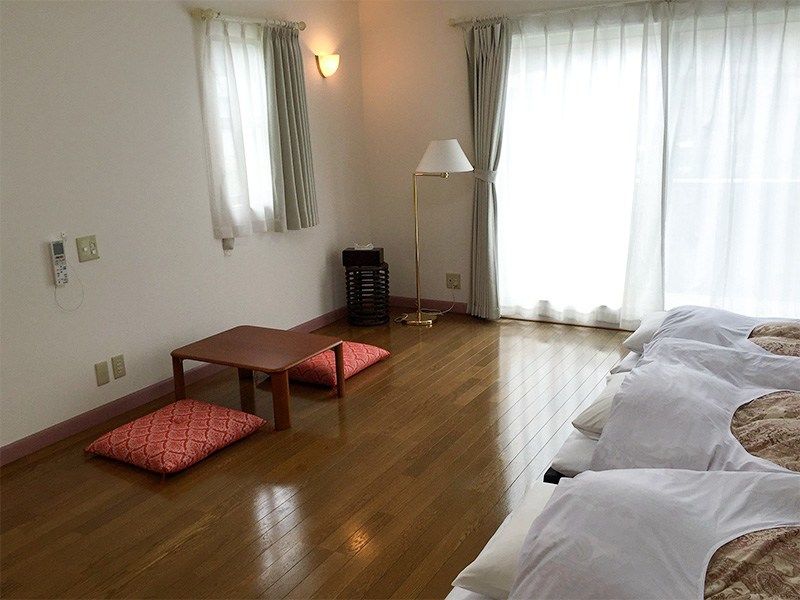
Japan’s First Halal Hotel Opens Near Mount Fuji
Guideto Japan
Culture- English
- 日本語
- 简体字
- 繁體字
- Français
- Español
- العربية
- Русский
Opening the Door to Muslim Tourists
Muslim tourists from Southeast Asia and other regions are on the rise as the number of foreign visitors to Japan climbs year by year. In response, hotels and other lodgings, particularly in tourist-dense Tokyo, are increasingly offering services like halal meals and prayers spaces that cater to the religious needs of guests. While more establishments these days are advertising themselves as Muslim friendly, in reality it remains impractical for hotels to invest in the facilities and trained staff needed to be fully halal compatible.
Against this backdrop, Japan in July 2016 welcomed what may be its first ever completely halal lodging, the Syariah Hotel Fujisan in the Fuji Five Lakes area of Yamanashi Prefecture. Located near the shores of Lake Kawaguchi, the cozy two-story accommodation combines Islamic amenities with views of Mount Fuji to the south and easy access to recreational facilities around Lake Kawaguchi.
Yamashita Yūji, president of the hotel’s parent company TS, says the firm decided to dip its toes into the Muslim market after seeing an uptick in visitors from Southeast Asia. “For years Chinese tourists made up the bulk of foreign visitors,” Yamashita explains. “Recently, though, more people from Indonesia and Malaysia are coming to the area. However, few businesses offer menu options and prayer spaces for Muslim travelers. We wanted to overcome this issue to make it easier for people from Islamic countries to visit.”
The company renovated a private home and consulted with Islamic organizations, Muslims living in Japan, and halal associations to bring the facilities up to religious standards. Yamashita says that while the hotel, which is part of the firm’s travel organization Fujisan Family, is still operating on a trial basis, he remains hopeful that business will continue to grow. He notes that more Muslim visitors from Indonesia, Malaysia, and Singapore are visiting Lake Kawaguchi after hearing about the Syariah Hotel in the Japanese and overseas press or by word of mouth.
A Taste of Japan
 The hotel's prayer room. (Courtesy of Syariah Hotel Fujisan)
The hotel's prayer room. (Courtesy of Syariah Hotel Fujisan)
The hotel has eight family guestrooms that offer standard amenities like free wi-fi, air conditioning, yukata for comfortable lounging, and high-tech toilets. Each room also has a qibla on the ceiling indicating the direction to face when praying. The front desk lends out copies of the Koran and prayer rugs along with long gowns for women wanting to pray. It also offers guests a small selection of halal snack foods and souvenirs. The hotel has a prayer room and a wudhu for ritual washing, and the entire facility is smoke- and alcohol-free.
Dining in Japan poses a challenge for many Muslims because of dietary restrictions, but hotel guests can enjoy authentic Japanese meals made using proper techniques and halal-certified ingredients like alcohol-free soy sauce. The Japanese-style breakfast includes rice, miso soup, grilled fish, and hot tōfu in seaweed stock. The lunchtime menu offers such dishes as grilled beef, chicken, and vegetable and shrimp tempura, along with flavors like tempeh familiar to people traveling from Southeast Asia.
Rooms start at ¥5,400 per person for a stay without meals. The hotel welcomes Muslims and non-Muslims alike, including Japanese who want to learn more about Islamic culture. Since opening the facility has averaged around 200 guests a month, although some customers have not come for religious reasons but have been foreign visitors who could not find accommodations at a standard hotel. Muslim patronage remains relatively low, hovering around 30%, and even dips to nearly zero during the fasting month of Ramadan.
 One of the hotel's eight family guest rooms. (Courtesy of Syariah Hotel Fujisan)
One of the hotel's eight family guest rooms. (Courtesy of Syariah Hotel Fujisan)
Yamashita says he is unfazed by the low number of Muslim guests. “We’re still experimenting with new approaches for attracting Muslim visitors,” he explains. Guests on average stay two nights to explore the Lake Kawaguchi area, and Yamashita notes that many people use the area as a base for summer climbing excursions to Mount Fuji and winter outings to enjoy the snow at nearby ski slopes.
The Japanese government’s push to woo foreign visitors to the country has largely been led by the Japan Tourism Agency and other entities working at the national level. In the spirit of Japanese hospitality, though, more needs to be done at the local level to promote lodgings like the Syariah Hotel that can accommodate the cultural and religious needs of Muslim travelers. Going forward, I sincerely hope that Muslim-friendly facilities will become common features of Japan’s tourism infrastructure.
(Originally published in Japanese on April 13, 2018. Banner photo: The Syariah Hotel Fujisan. Photo by author.)